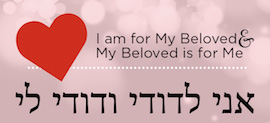
I Love Elul
By: Rabbi Jonathan Gewirtz, The Observant Jew
It’s been ingrained in many of us for our entire lives that the carefree existence of summer ends abruptly with the stark arrival of Elul. It’s like a prison door has been slammed unceremoniously on the joy and freedom we have had and suddenly it’s time to straighten out and fly right. Do Teshuva! Know that HaShem is watching you and YOU WILL BE JUDGED.
It struck me this year that this concept is incongruous with what Elul stands for. Not conceptually, but acronymically. Elul is an acronym for the phrase from Shir HaShirim, “Ani L’dodi V’dodi Li,” which means, “I am devoted to my beloved, and He is greatly devoted to me.” (The emphasis was added by R’ Mordechai Gifter z”l whom I still recall hearing express this idea as if it were yesterday or maybe a few weeks ago.)
The question is, if Elul is all about buckling down and fear of judgment, why do we choose such an incongruous acronym?
Let’s take it a step further. There are other acronyms for Elul too. One of them is from Parshas Mishpatim (Shemos 21:13.) There the posuk says, “V’HaShem Ena L’yado V’samti Lach,” HaShem brought it to his hand, and I will set for you [a place to take refuge.] It refers to the fact that if one killed inadvertently, HaShem provides a safe haven for him to be protected from vengeance.
Wait a minute, if Elul is about HaShem trying to “get” us, why would we use a phrase that discusses getting off the hook? That doesn’t sound like the Elul I’ve been hearing about all these years.
There’s an Elul phrase in the Megilla too. “Mishloach manos Eesh L’rayaihu, U’matanos L’evyonim,” that Purim was established as a day of sending gifts to friends and poor people. If Elul is about G-d and me, where do others come into the picture? Once again, whoever came up with these acronyms seems to be describing a very different Elul than I’m used to.
There are others, but I’m sure by now you get the point. What I’m starting to realize is that Elul is really quite different than we might imagine.
Elul is about enhancing our relationship with HaShem. Ani L’Dodi, I am dedicated to my beloved. I want to straighten out not because HaShem will be mad at me or punish me, but because I love Him and want to do everything I can to make Him happy. I do Teshuva because I realize that sins show I don’t love him enough to control myself.
In Parshas R’eh, we learn about the Navi Sheker, the false prophet who tries to get us to serve other gods. The Torah says this is a test of our love for HaShem. Why is it not a test of our fear of Heaven?
It is because love is much stronger than fear. One who fears HaShem and doesn’t want to anger Him may be fooled by the false prophet who is offering evidence that “G-d” told me you should do this. One who loves HaShem will not be taken in by someone like this because his love of HaShem wouldn’t allow him to accept any other god. He simply couldn’t do that to his relationship and wouldn’t be able to open his heart to a foreign deity.
Elul is also a sanctuary. It’s a place where HaShem says, “I know you were a victim of circumstance and didn’t mean to sin.” However, if one has intention to commit the murder, a city of refuge won’t protect him even if he runs there. One who is antagonistic of HaShem will also not find the asylum that Elul offers those of us who don’t want to push HaShem away.
Finally: the connection to other people. If HaShem is a father, then all Mankind are His children. When we fight amongst ourselves, this pains Him. (Ask any parent how they feel when their kids fight.) We have the Elul acronym which suggests that we work on our human relationships at this time, to strengthen our connection to our siblings from our Father.
Further, how people see and perceive us reflects on our Father, HaShem. We have to be kind and merciful as He is, so people come to love Him through our actions.
In short, Elul is a time of opportunity. It’s a time to be excited about building a deeper relationship and growing our love with HaShem. We know that Rosh HaShana is coming, when we will proudly declare that HaShem is our one and only. It’s not scary; it’s exhilarating. We’re not giving up our freedoms, but focusing our energies.
It’s a time to revel in the chances to improve our bond with our Father in Heaven and through that know that we’ll be blessed with a sweet new year – the Shana Rishona of marriage – in which our Groom will do all He can to make us happy.
© 2018 – All Rights Reserved
Did you enjoy this column? Feedback is welcome and appreciated. E-mail info@JewishSpeechWriter.com to share your thoughts. You never know when you may be the lamp that enlightens someone else.